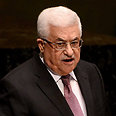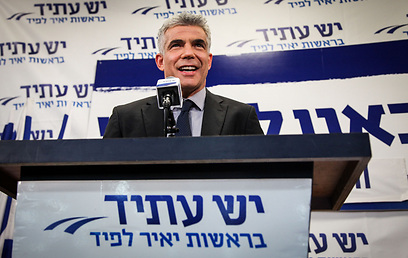
Hoping to capitalize on the unexpected strength of moderates in Israel's incoming parliament, Palestinian President Mahmoud Abbas wants to sit down with representatives of Israeli parliamentary factions within the next two weeks to discuss the possibility of settling the Israeli-Palestinian conflict peacefully, Yasser Abed Rabbo, secretary general of the Council of the Palestine Liberation Organization, said Thursday.
"We invite the Israeli parties, particularly the new ones, for dialogue on future accords," Abed Rabbo said.
Related articles:
- Op-ed: Yair's torch
- US calls for resumption of peace talks
- Lapid's terms: Universal draft, peace talks
- Lapid's terms: Universal draft, peace talks
He did not say when the invitations would go out, but emphasized that Abbas wanted the meeting to take place before Israel forms its next government - a process that is expected to take several weeks.
A Palestinian source who is familiar with the details told Ynet that Abbas plans to invite Israelis who are expected to become Knesset members for the first time following Tuesday's national elections in the Jewish state.
According to the source, Yesh Atid leader Yair Lapid, who won a surprising 19 Knesset seats in the elections, will be the first to receive an initiation to Ramallah, "along with new Knesset members from Labor, Meretz and even some Likud Knesset members."
The source explained that Abbas wants to make certain that the peace process is on the agenda of the next Israeli government and wants to discuss with the moderate Israeli politicians the possibility of reaching a peace agreement.
In early December Abbas set up a new Palestinian committee that is expected to meet with representatives of Israel's various sectors – including MKs, members of the academia, journalists and other public opinion leaders to discuss the two-state solution. The Palestinians fear the window of opportunity for the establishment of a Palestinian state within the framework of an agreement with Israel is closing. The committee consists of senior Palestinian officials, intellectuals and journalists. Hanan Ashrawi and Jibril Rajoub are among the senior officials who will serve on the committee.
Tuesday's parliamentary vote ended in a surprise deadlock between a hawkish, religious bloc and a camp of centrist, secular and Arab parties. While Benjamin Netanyahu, as head of the largest single party in parliament, appears set to remain prime minister, he can't put together a stable coalition without drawing in moderates beyond his traditional hardline and religious base.
He has already extended his hand to a new centrist party that advocates more serious efforts to end the decades-old Israeli-Palestinian conflict.
Peace talks reached an impasse before Netanyahu came into office four years ago and never resumed in earnest.
Abed Rabbo said the Palestinians have not dropped two longstanding conditions for negotiations - Israel must stop settlement building and the contours of the Palestinian state must be negotiated on the basis of the borders Israel held before 1967.
While opinion polls indicate a majority of Israelis back the establishment of a Palestinian state alongside Israel, peacemaking was barely mentioned as a campaign issue, reflecting widespread doubts that peace is possible after decades of violence and stop-and-go talks.
Still, the election's outcome defied forecasts that Netanyahu and his allies would steer a government with an even more hard-line makeup.
Instead, his top partner is likely to be Yesh Atid, a new party with moderate views on peacemaking that has emerged as Israel's new power broker.
Political newcomer Lapid has said he will not sit in a government that is not seriously pursuing peace with the Palestinians. But the focus of his campaign has been mostly on helping the needs of Israel's struggling middle class, raising questions about how hard he will push on the peace issue.
Lawmaker Avigdor Lieberman, a Netanyahu ally, told Israel Radio on Thursday that the next government must focus on domestic issues rather than peacemaking to avoid political paralysis, given lawmakers' sharply divergent views.
"If we want to founder from the outset, and embark upon endless internal struggles, then make foreign policy the top priority," he said.
"If we want the government to be effective and accomplish things, and leave a strong, significant imprint, I think everyone understands the need for domestic changes is dramatic, and that is the order of the day. So leave the foreign issues aside," he said.
Netanyahu has hinted that is the direction he is going in through the two brief statements he has given since the election results came in late Tuesday. Both statements have focused on the need to build a broad coalition to address pressing domestic issues.
Lieberman's ultranationalist Yisrael Beiteinu party teamed up on a joint list with Netanyahu's Likud for Tuesday's election.
You can contact Elior Levy, Ynet's Palestinian Affairs Correspondent, at: [email protected]
- Follow Ynetnews on Facebook and Twitter
- Receive Ynetnews updates
directly to your desktop
















